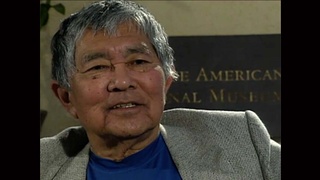Interviews
We’re Still Japanese
And immediately when that happened, I thought, God, what's going to happen to us? We didn't think about being thrown into camps, certainly, but we still -- we had the, "We are Japanese." We're not, we're not Japanese Americans, we were still a Japanese kind of thing. Although we danced jitterbug and listened to swing music, we're still Japanese. And yet we couldn't relate to the Japanese in Japan, so there was really a conflict there. Who are we?
Again, identity was a big problem for me. And I didn't want to be a part of that stuff at all. And yet, golly, I look in the mirror, and I'm Japanese. So this was a major identity problem. And so there was a feeling of guilt, too, being Japanese. Japanese name. Eating gohan. And yet I didn't feel a part of that scene over there because I had not been to Japan at that time, no contact with any of my relatives over there. So internally, it was a terrible time. On the other hand, in the community still, I was not part of the mainstream community. I was still in the Japanese community. And all my friends were Niseis. So we were all somewhat confused, yeah.
Date: February 18, 2002
Location: Washington, US
Interviewer: Alice Ito, John Pai
Contributed by: Denshō: The Japanese American Legacy Project.
Explore More Videos

Parents identification as Peruvian Okinawan
Okinawan American whose parents are from Peru.

Okinawan cultural appreciation
Okinawan American whose parents are from Peru.

Prejudice against Okinawans from mainland folks
Okinawan American whose parents are from Peru.

American values she aligns with
Okinawan American whose parents are from Peru.

Working together in Okinawa using three languages
Okinawan American whose parents are from Peru.

The lack of discussion about family’s incarceration in Amache
Sansei judge for the Superior Court of Los Angeles County in California

Passing Time in the Camps with Baton Twirling
(b. 1932) Nisei American stage, film, and TV actress

Expressing herself through poetry
(b. 1923) Japanese American poet, activist

Loss When Leaving for Manzanar
Japanese American animator for Walt Disney and Hanna Barbera (1925-2007)

About Escobar (Spanish)
(b. 1962) Nisei Japanese Argentinian, currently residing in Japan

Stories of Grandfather at a concentration camp in Fusagasuga
(b.1974) Japanese Colombian who currently resides in the United States

Her definition of Nikkei
(b.1974) Japanese Colombian who currently resides in the United States

Her grandfather in a concentration camp in Fusagasuga (Spanish)
(b.1974) Japanese Colombian who currently resides in the United States


Foreign language education was severely restricted during the war
Professor of Law, University of Sao Paulo, Lawyer, Translator (b. 1948)
